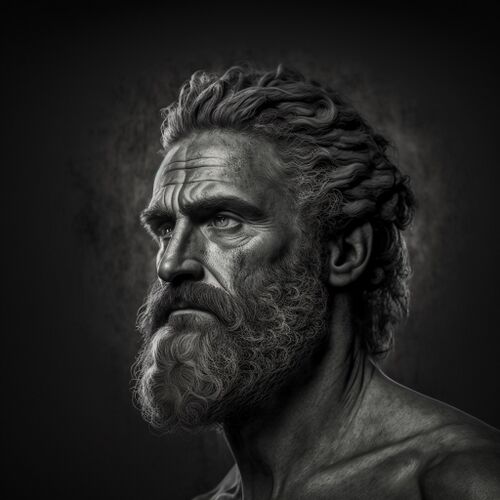More actions
m Added desc. |
Updated intro. |
||
| Line 2: | Line 2: | ||
{{short description|Homer’s epic of return.}} | {{short description|Homer’s epic of return.}} | ||
{{Large|Journey with Odysseus in Homer’s ''Odyssey''}} | {{Large|Journey with Odysseus in Homer’s ''Odyssey''}} | ||
{{dc|H}}{{start|omer’s ''Odyssey'' is a cornerstone of Western literature}}, an epic that combines adventure with explorations of human resilience, identity, and morality. The poem picks up after the fall of Troy, chronicling Odysseus’ ten-year journey home to Ithaca, where he must reclaim his place as king, husband, and father. While Odysseus himself is the focal point, Homer’s narrative gives space to a wide range of characters and perspectives, making the epic a rich variety of interconnected stories. Across its twenty-four books, the ''Odyssey'' illustrates themes of loyalty, cunning, fate, and the enduring human desire for homecoming (''nostos''). | |||
[[File:Odysseus-MJ.jpg|thumb|Odysseus, King of Ithaka|500px]] | |||
The poem begins with the Telemachy (Books 1–4), a focus on Odysseus’ son, Telemachus, as he comes of age in the face of mounting challenges. Telemachus must contend with the suitors vying for his mother Penelope’s hand, all while yearning to learn the fate of his absent father. Guided by Athena, the goddess of wisdom, Telemachus embarks on a journey to Pylos and Sparta to seek news of Odysseus. This section not only sets the stage for Odysseus’ eventual return but also explores themes of generational legacy, divine intervention, and the struggles of transitioning from youth to adulthood. | |||
Books 9–12 present Odysseus’ own tale, as he recounts his adventures to the Phaeacians. This portion of the epic is rich in mythical episodes: the blinding of the Cyclops Polyphemus, the deadly allure of the Sirens, his crew’s tragic encounter with Scylla and Charybdis, and the temptation of the Lotus-Eaters. Each of these encounters reflects Odysseus’ resourcefulness, but also his flaws, particularly his hubris. This section examines themes of temptation, survival, and the tension between human agency and the will of the gods. Odysseus’ storytelling here highlights the importance of memory and narrative in shaping identity. | |||
The ''Odyssey'' culminates with Odysseus’ homecoming in Books 22–23. Disguised as a beggar, Odysseus returns to Ithaca, where he must confront the suitors who have overrun his household. With the help of Telemachus and a few loyal servants, Odysseus reclaims his throne in a dramatic scene of justice and retribution. Yet, the reunion with Penelope is equally poignant, as she tests Odysseus to ensure his identity. These final books underscore the themes of loyalty, family, and the restoration of order. Odysseus’ journey home is not merely a physical one but an emotional and moral reckoning with what it means to belong. | |||
Through its complex structure and interwoven narratives, the ''Odyssey'' offers a complex exploration of the human condition. Whether through Telemachus’ quest for identity, Odysseus’ trials and triumphs, or Penelope’s quiet strength, Homer’s epic resonates with universal questions about perseverance, justice, and the enduring power of home. | |||
{{clr}} | {{clr}} | ||
<span style="float: left; margin: 5px 0 20px 0;">{{Clickable button 2|/Overview|Begin Exploring »|class=mw-ui-progressive}}</span> | <span style="float: left; margin: 5px 0 20px 0;">{{Clickable button 2|/Overview|Begin Exploring »|class=mw-ui-progressive}}</span> | ||
{{clr}} | |||
{{plink|https://grlu.us/odyssey}} | {{plink|https://grlu.us/odyssey}} | ||
{{Epic}} | {{Epic}} | ||
Revision as of 11:12, 7 January 2025
Journey with Odysseus in Homer’s Odyssey
Homer’s Odyssey is a cornerstone of Western literature, an epic that combines adventure with explorations of human resilience, identity, and morality. The poem picks up after the fall of Troy, chronicling Odysseus’ ten-year journey home to Ithaca, where he must reclaim his place as king, husband, and father. While Odysseus himself is the focal point, Homer’s narrative gives space to a wide range of characters and perspectives, making the epic a rich variety of interconnected stories. Across its twenty-four books, the Odyssey illustrates themes of loyalty, cunning, fate, and the enduring human desire for homecoming (nostos).

The poem begins with the Telemachy (Books 1–4), a focus on Odysseus’ son, Telemachus, as he comes of age in the face of mounting challenges. Telemachus must contend with the suitors vying for his mother Penelope’s hand, all while yearning to learn the fate of his absent father. Guided by Athena, the goddess of wisdom, Telemachus embarks on a journey to Pylos and Sparta to seek news of Odysseus. This section not only sets the stage for Odysseus’ eventual return but also explores themes of generational legacy, divine intervention, and the struggles of transitioning from youth to adulthood.
Books 9–12 present Odysseus’ own tale, as he recounts his adventures to the Phaeacians. This portion of the epic is rich in mythical episodes: the blinding of the Cyclops Polyphemus, the deadly allure of the Sirens, his crew’s tragic encounter with Scylla and Charybdis, and the temptation of the Lotus-Eaters. Each of these encounters reflects Odysseus’ resourcefulness, but also his flaws, particularly his hubris. This section examines themes of temptation, survival, and the tension between human agency and the will of the gods. Odysseus’ storytelling here highlights the importance of memory and narrative in shaping identity.
The Odyssey culminates with Odysseus’ homecoming in Books 22–23. Disguised as a beggar, Odysseus returns to Ithaca, where he must confront the suitors who have overrun his household. With the help of Telemachus and a few loyal servants, Odysseus reclaims his throne in a dramatic scene of justice and retribution. Yet, the reunion with Penelope is equally poignant, as she tests Odysseus to ensure his identity. These final books underscore the themes of loyalty, family, and the restoration of order. Odysseus’ journey home is not merely a physical one but an emotional and moral reckoning with what it means to belong.
Through its complex structure and interwoven narratives, the Odyssey offers a complex exploration of the human condition. Whether through Telemachus’ quest for identity, Odysseus’ trials and triumphs, or Penelope’s quiet strength, Homer’s epic resonates with universal questions about perseverance, justice, and the enduring power of home.
